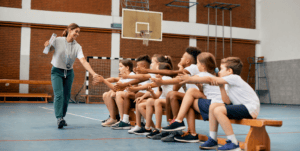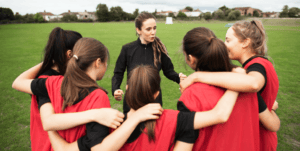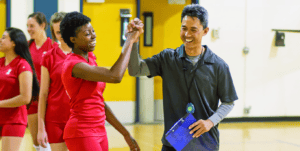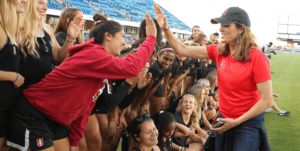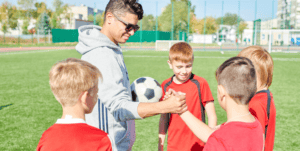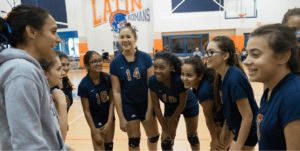Webinar Recap: Building Body Confidence in Sports with Dove, PCA, and Gotham FC

07.29.25
In partnership with Dove and Gotham FC, Positive Coaching Alliance recently hosted a powerful and timely webinar around one of the most pressing issues facing girls in sports: body confidence. The “Building Body Confidence in Sports” webinar, moderated by PCA’s Director of National Partnerships, Marti Love, featured a diverse and inspiring panel of voices who are reshaping how we think and talk about girls’ experiences in sport.
Panelists included Michelle Betos (Retired Pro Athlete, Assistant Coach at Gotham FC), Ally Carda (USA Softball Olympian), Rori Harmon (University of Texas Women’s Basketball Player), and Dr. Nicole LaVoi (Director, Tucker Center for Research on Girls & Women in Sport). Together, they explored the complex intersections of sport, identity, performance, and body image, and why this conversation is more important than ever.
Continue your journey by watching the webinar replay, and reviewing these impactful insights and memorable quotes in order to help foster body confidence and support across your team:
“Sport can be an incredible protector of body confidence—when approached with care and respect.” – Dr. Nicole LaVoi
- Backed by research from the Body Confident Sport tool, Dr. LaVoi emphasized that adolescence is a critical window. Sport can be empowering for girls, but that empowerment isn’t guaranteed—especially with body image being a top reason nearly half of all girls drop out during adolescence. This webinar reinforced a powerful truth: whether sport builds confidence or breaks it down depends on the intentional choices made by coaches, parents, and role models. Coaches who build inclusive, respectful, and comparison-free team cultures can help girls stay in the game longer.
Body Functionality > Body Appearance
- Healthy fueling and body functionality became another central theme of the conversation. “I’m not here to look a certain way. I’m here to be the strongest, most powerful pitcher I can be.” – Ally Carda. Ally opened up about the shift from trying to “look” like an athlete to simply “being” one. When coaches talk about what the body can do rather than how it looks, they help athletes focus on performance and strength.
“What coaches celebrate, athletes repeat.” – Michelle Betos
- Coaches have the power to set the tone. Whether it’s celebrating rest, resilience, effort, or teamwork, athletes internalize what you praise. Avoid focusing on looks—focus on preparation, progress, and heart. Coaches must intentionally create safe environments. “The best coaches I’ve had are the ones who put the human before the athlete” said Carda. Athletes will remember how you made them feel. Prioritize care, empathy, and safety in your coaching—especially around body talk.
Representation and Mindset Matter
- Rori Harmon reminded us that stereotypes around body type show up in subtle (and not-so-subtle) ways. She shared the challenges she faced around height expectations in her position. “It’s always like, ‘You can’t do that—you’re too short.’ But I always tell young girls: It’s not about your size. It’s about your mindset.” Coaches should be vocal in breaking those harmful stereotypes down and never make assumptions about an athlete’s ability based on a certain body type. Coaches can reinforce confidence in what athletes can do—regardless of size or shape.
Language is Crucial, and Locker Rooms Should Be ‘Body Talk-Free Zones’
- The language coaches use can shape how girls perceive themselves for years to come. Michelle shared how, in her youth soccer days, casual comments from coaches about bodies led to disordered eating among teammates. Betos shared “Not eating enough at lunch isn’t fitness, it’s the opposite. Girls need to eat to train, compete, and love the sport.” It’s critical that coaches recognize the unintended consequences of their words. Fueling is strength—make sure your team knows that. Dr. LaVoi mentioned the impact of creating a “Body Talk-Free Zone” from the tool–intentionally eliminating negative body talk, especially in team environments like the locker room. Athletes are watching—and listening. Even small shifts in language create a culture where athletes feel safe, supported, and focused on what their bodies can do—not how they look.
Rest, Recovery and Seeking Support Aren’t Weakness—they’re Winning Strategies
- The panelists collectively emphasized the importance of redefining strength, celebrating recovery, and teaching athletes how to listen to their bodies. “Sometimes the best thing I can do is rest, put my legs up, and do nothing,” said Betos. Carda, who recently underwent ankle surgery, agreed. “Rest is part of being great. I used to push through everything—but that’s not sustainable.” The idea that working smarter, not harder, supports both well-being and performance echoed through every story. After a major injury left her physically and emotionally shaken, Harmon discovered the critical role that community and openness play in healing—and emphasized how important it is to seek help and have someone to talk to. Modeling recovery as a strength—not a weakness—is vital. Don’t just allow rest; encourage it as a performance tool.
Whether you’re a coach, a parent, or a peer, your voice matters. Your words matter. Every comment, every shout-out, every moment of listening helps build – or break – an athlete’s body confidence. “You are the culture creators,” said Marti Love in closing. “What you model and teach has ripple effects far beyond the season.” Our challenge is not to avoid the topic but to embrace it with care and courage.
Take the next step by downloading the Dove Body Confident Sport Coaching Tool. This free resource offers coaches practical scenarios, scripts, and strategies to cultivate positive team cultures. Use it to lead these conversations with your team. Build confidence. Celebrate differences. And help keep girls in the game.


